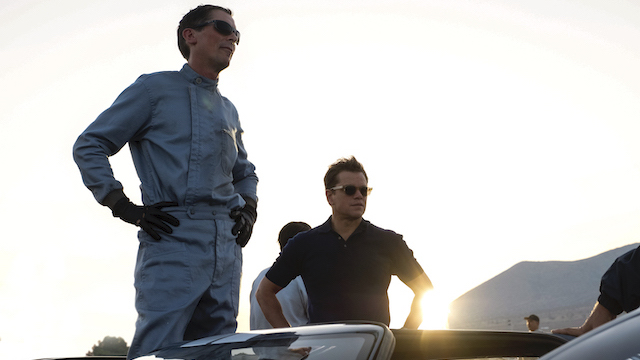Movies & TV / Reviews
Ford v Ferrari Review
 Image Credit: Walt Disney Studios/20th Century Fox
Image Credit: Walt Disney Studios/20th Century Fox

Directed By: James Mangold
Written By: Jez Butterworth, John-Henry Butterworth and Jason Keller
Runtime: 152 minutes
MPAA Rating: Rated PG-13 for some language and peril
Christian Bale – Ken Miles
Matt Damon – Carroll Shelby
Jon Bernthal – Lee Iacocca
Caitriona Balfe – Molly Miles
Josh Lucas – Leo Beebe
Tracy Letts – Henry Ford II
Remo Girone – Enzo Ferrari
Ray McKinnon – Phil Remington
Noah Jupe – Peter Miles
Rudolf Martin – Dieter Voss
The talented filmmaker James Mangold revs into theaters this week with his new movie, Ford v Ferrari. It’s a great film based on one of the unsung heroes of the American automotive and motorsports industry, Ken Miles (Christian Bale). The film features impeccable performances, competently direction, impressive racing scenes, as the title promises and a compelling underdog story that many moviegoers will enjoy.
In the early 1960s, the Ford Motor Company is teetering over the edge. The company is on the ropes and not the industry leader it was before, while General Motors and Chevrolet have moved ahead. Henry Ford II (Letts) is sending out ultimatums. Marketing executive Lee Iacocca (Bernthal) believes Ford needs an edge that will offer an appealing sports car to the baby boomer generation and one that can compete on the global racing scene. Unfortunately, the first strategy to acquire the Ferrari line from bankrupt founder Enzo Ferrari (Girone) goes sideways. However, Ferrari made the mistake of insulting Ford II, aka The Deuce. The challenge is simple. Ford Motor Company has to come up with a new sports car that can compete with Ferrari at the 24 Hours of Le Mans to show up Enzo Ferrari on the grand stage and send a much-needed shot in the arm for Ford on the sales floor.
Enter one retired racecar driver and automotive designer, Carroll Shelby (Damon). Shelby was forced into retirement from the professional racing circuit due to a heart ailment, but he’s still mentoring the likes of an amateur pro racer and blue-collar mechanic Ken Miles (Bale). Iacocca recruits Shelby to do the impossible: create a car that won’t just be able to compete with Ferrari at Le Mans, but come out on top. Shelby is put in charge of the ambitious program, and he wants the surly, uncouth Miles to be the face of the facing team, much to the chagrin of top Ford executives such as Leo Beebe (Josh Lucas at his slimy corporate best). With a clock ticking to make it to Le Mans, Shelby and Miles butt heads and overcome corporate red tape and bureaucracy almost single-handedly making the Ford Motor Company a relevant brand again.
Mangold did exceptionally well with the central and supporting cast here. Christian Bale’s performance as Ken Miles is the standout of the movie, and he plays very well off of Damon. Damon uses a southern accent for Shelby, which for the most part, sounds fairly consistent. Jon Bernthal has the basis of an interesting performance that goes against his usual type. Unfortunately, his character sadly disappears into the background in the film’s second half.
Even Josh Lucas, a fairly underrated talent, does solid work here in a pretty thankless role as Leo Beebe. Beebe is an unlikable corporate slime ball. It’s a fairly two-dimensional role, but Lucas believably plays him. The character is an interesting representation of corporate meddling, and that idea plays a significant role in the actual history of Le Mans ’66. Not to mention, corporate stooges such as Leo Beebe have real historical precedence.
Bale is the true star and standout performer here. It’s one of the most well-rounded performances of his career. Ken Miles is a great everyman. As a professional, he’s very brusque and inappropriately blunt with his colleagues. He certainly has a chip on his shoulder, but he’s a kind father and husband. Bale brings a natural quality to Miles, and an actual humorous intensity when Miles gets behind the wheel of the Ford GT40.
Mangold nails the racing sequences. They are not sloppy or overdone. They are fairly straightforward to discern. The danger and suspense are vivid and palpable. Ford v Ferrari offers a unique look at that connection a racer has with both the track and their vehicle that’s at the core of the picture.
Even at two hours and 32 minutes, Ford v Ferrari is fairly evenly paced. Some minor subplots could have been done with less fleshing out. The ending, while accurate to history, struggles to find the best emotional stopping point. Ford v Ferarri slows to a stop for the finish rather than an exciting sprint.









